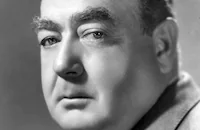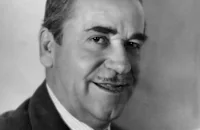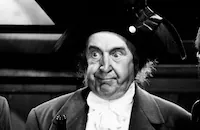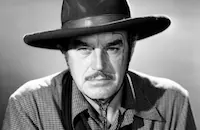Caravan
Cast & Crew
Erik Charell
Charles Boyer
Loretta Young
Jean Parker
Phillips Holmes
Louise Fazenda
Film Details
Technical Specs

Synopsis
When the wine harvest season arrives in the Tokay region of Hungary, the administrator of the Chateau Tokay contracts with the gypsy chief to employ gypsies for three days. Because the quality of the wine depends on the music played during the harvest, the most important part of the contract instructs Lazi, the blasé gypsy violinist, to compose a new song. Lazi finds the inspiration for his song during an embrace with Tinka, a gypsy girl who loves him but towards whom he has grown somewhat ambivalent. That day marks the return to the chateau of Countess Wilma after fourteen years abroad. Wilma, who expects to become the mistress of the estate when she turns twenty-one the next day, is incensed to learn from the executor of her father's will, her uncle, Baron von Tokay, that she must be married by her twenty-first birthday in order to inherit the estate. The baron desires her to marry his son, Lieutenant von Tokay, who has reluctantly left his friends and consorts in Budapest and is expected to arrive that day. Wilma, however, refuses to comply with the baron's wishes and, hearing Lazi's song, proposes to him. Struck by her beauty, Lazi consents. When the aristocratic guests, disgraced by Lazi's presence, leave the chateau, Wilma opens the house to the gypsies. Although she resists Lazi's attempts to kiss her, she goes with Lazi to an inn, where, dressed as a gypsy, she declares that the "countess" is dead. Lieutenant von Tokay arrives at the inn and, thinking that Wilma is a gypsy, flirts with her. Seeing their mutual interest, Lazi takes Wilma back to the estate, where the gypsies are still celebrating. The lieutenant follows and, after dancing with Wilma, confesses his love; however, when he explains that he is supposed to marry the countess and suggests that Wilma have a clandestine affair with him, she slaps him. At the baron's request, troops arrive to disperse the gypsies, and the lieutenant rides off with Wilma. She allows him to kiss her, but then steals his horse and leaves him stranded. The lieutenant wanders into the gypsy camp, where he finds Tinka crying over her loss of Lazi. He suggests that they try to forget their suffering together, but their attempt at love fails, and the lieutenant discovers that he only wants Wilma. At the estate, when he learns Wilma's true identity, the lieutenant rails at her for marrying a gypsy in order to keep control of her land. Lazi rescues Wilma from a knife attack by the jealous Tinka and then spends the wedding night alone because of a family tradition. Lazi overhears Wilma tell a priest of her unhappiness, and when the priest suggests that Lazi, being a gypsy, would accept one hundred pengö for an annulment, Lazi indignantly tells Wilma that there is not enough money to pay for his love and gives her her freedom for nothing. However, he orders the gypsies to stop playing his music and urges them to steal from the chateau before they leave. Wilma prepares to depart until an innkeeper tells her that the townspeople, fearing a failure of the wine harvest, feel that only she can keep the gypsies from leaving. She then rides out to Lazi and convinces him to play his song so that the harvest can continue. After she and Lazi amicably say goodbye, she discovers that the lieutenant, who learned from Lazi of his break up with Wilma, has taken the reins of her carriage. He and Wilma sing Lazi's song as they happily ride back to the estate. The gypsies also sing as they work, while Lazi gives Trina a necklace that he stole from Wilma, and they embrace in their wagon as they ride off.

Director
Erik Charell
Cast

Charles Boyer

Loretta Young

Jean Parker

Phillips Holmes

Louise Fazenda

Eugene Pallette

C. Aubrey Smith

Noah Beery

Dudley Digges

Richard Carle

Billy Bevan
Lionel Belmore

Armand Kaliz
Harry C. Bradley
Spencer Charters

Harry Woods
Esther Muir
Georgette Rhodes
Blanca Vischer
Crew
Don Anderson
Robert Bischoff
Erik Charell
Erik Charell
Warner Cruze
William Darling
Louis De Francesco
W. F. Fitzgerald
Ray Flynn
James Gordon
Werner Richard Heymann
Werner Richard Heymann
Gus Kahn
Robert T. Kane
Hans Kraly
Sammy Lee
Melchior Lengyel
Robert Liebmann
Robert Mack
Ernest Palmer
Samson Raphaelson
Arthur Ripley
Theodor Sparkuhl
Ernst Stern
Ernst Stern
Anthony Ugrin
Raymond Van Sickel
A. L. Von Kirbach
Bernard Zimmer

Film Details
Technical Specs

Quotes
Trivia
Notes
Fox also produced a French-language version of this film, Caravane. The working titles of the English version film were Gypsy Melody, which was the translated title of Melchior Lengyel's original story, and By Royal Command. According to information in the legal records, Lengyel's story was originally written in Hungarian and then was translated into German. Although the French onscreen credits and early billing sheets for the English language version calls Lengyel's work a novel, information in the legal records confirms that the work was an original story, which had never been published nor copyrighted. Both Erika Gathmann and Hans Kraly translated Liebmann's continuity into English from its original German, but only Kraly's translation was used for the film. Jeannette Marchal translated the English screenplay into French for the French version of the film. Oscar Sheridan contributed original "sketches" for tests, but it is not known if any of his material was used in the final film. Edgar Kennedy was originally cast in the role of the "Administrator," and Lew Ayres was to play a role in the film, which was probably that of "Lieutenant von Tokay." According to Hollywood Reporter, M-G-M loaned Louise Fazenda for the film.
This was the first American film of European producer-director Erik Charell. Modern sources state that because of the success of Charell's 1931 film for Ufa, Der Kongress Tanzt (Congress Dances) he was invited by Fox to make this film. Variety noted that Caravan was made in "the European style of musical film producing....it is big, beautiful and boring." News items note that in addition to Charell, a number of the people involved in the production were European, including Charles Boyer, Robert Liebmann, art director Ernst Stern and composer Werner Richard Heymann. According to a Hollywood Reporter news item, at the beginning of production, Fox decided to make the film a "super-special" budgeted at over a million dollars, and Daily Variety reported that 3,000 extras would be used in the production.
Modern sources note that the film was a failure and that afterward, Charell's film career virtually ended. According to modern sources, Charles Boyer met and married Pat Paterson, an up-and-coming Fox star, while waiting for production of this film to begin. Modern sources also state that scenes in the film were shot in the California and New Mexico deserts.












